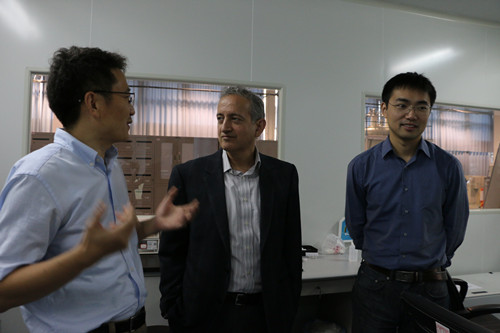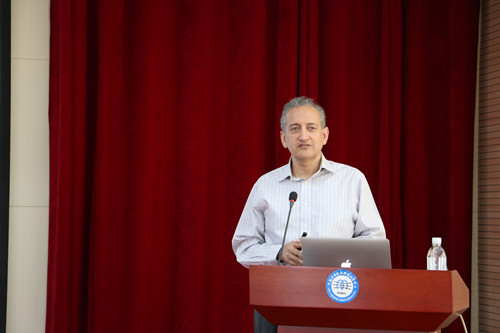Invited by the High Magnetic Field Colloquium, Prof. Jainendra K. Jain, a theoretical physicist from Pennsylvania State University, visited the High Magnetic Field Laboratory, Chinese Academy of Sciences (CHMFL) on Oct. 19th. During the visit, Prof. Jain gave a lecture entitled “Composite fermion Fermi sea: Is the glass half empty or half full? ” and a lot of researchers and students attended.
Composite fermions are emergent topological particles that arise as a result of interaction between electrons confined to two dimensions and exposed to a strong magnetic field. They were postulated to explain the phenomenon of the fractional quantum Hall effect as the integer quantum Hall effect of composite fermions. As the original postulator of composite fermions, Prof. Jain gave a brief pedagogical introduction of composite fermion and then came to some recent puzzles regarding a remarkable manifestation of composite fermions at the half filled Landau level, namely their Fermi sea, which arises as a non-perturbative consequence of emergent gauge fields in a system where there was no Fermi sea to begin with. The lecture attracted a lot of attentions and heated discussions followed after.
Before the talk, Prof. Jain also had a laboratory tour and discussion with research groups in the material science division of CHMFL, which set bases for further cooperation in the near future.
Jainendra Jain was born in India and received Ph.D. degree from Stony Brook University (1985). He joined the Stony Brook University as a faculty in 1989, and then moved to Penn State in 1998. Jain is interested in unexpected quantum mechanical reorganizations that occur when a large number of particles interact, best known for work leading to the discovery of exotic particles called “composite fermions,” which he had postulated to explain the fractional quantum Hall effect. Jain received many awards, including the American Physical Society’s Oliver E. Buckley Prize in 2002, the Distinguished Postdoctoral Alumnus Award from the University of Maryland, etc. He is currently the Evan Pugh University Professor and Erwin W. Mueller Professor at Penn State, and also holds the Raman Visiting Chair and Infosys Visiting Chair Professorships in India.
 |
|
Laboratory |
|

|
|
Lecture |